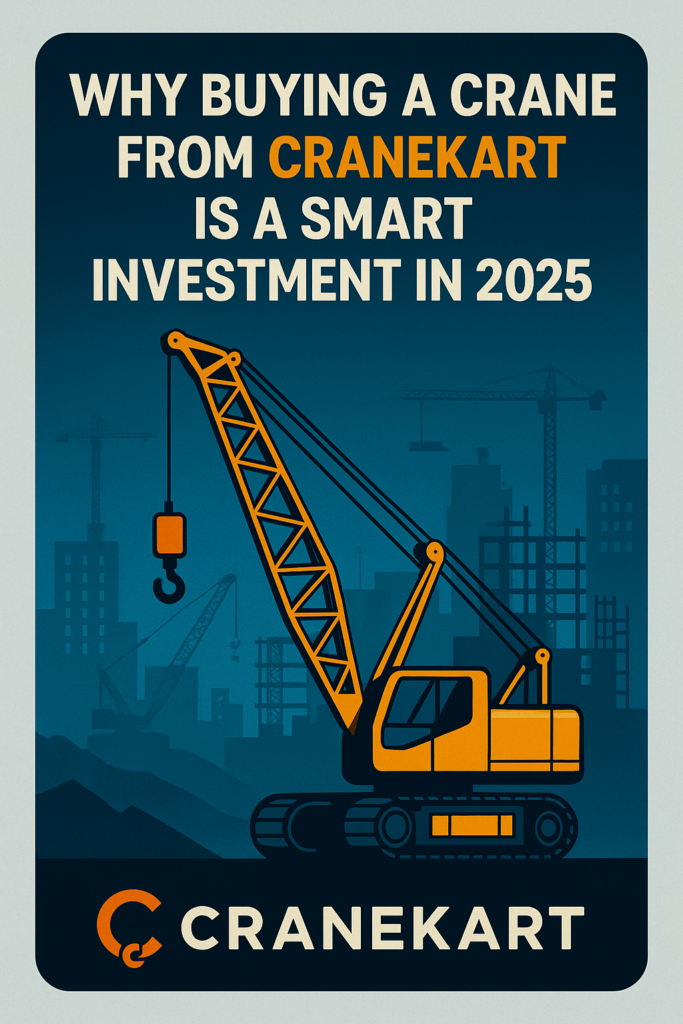Smart Cranes: The Future of Lifting

The crane industry is undergoing a massive transformation with the integration of advanced technologies. From automation and AI-powered safety systems to IoT-based monitoring, modern cranes are becoming more intelligent, efficient, and safer than ever before. As construction projects become larger and more complex, the demand for smart cranes technology is increasing rapidly.
In this blog, we will explore how technology is shaping the future of cranes and why these innovations matter for the lifting and construction industry.
Why Smart Cranes Technology is the Future
Traditional cranes relied heavily on manual operations, making them prone to human error, inefficiencies, and safety risks. However, smart cranes technology leverages cutting-edge innovations to enhance precision, safety, and productivity. These advancements provide significant benefits such as automated operations, predictive maintenance, remote monitoring, and reduced environmental impact.
Key Technological Innovations in Smart Cranes
1. Automation and AI-Driven Control
Automation is one of the most significant advancements in crane technology. AI-powered control systems enable cranes to perform complex lifts with minimal human intervention, ensuring high precision and safety.
Benefits of AI-driven automation:
- Reduced risk of accidents caused by human error
- Optimized load balancing for safer lifts
- Enhanced efficiency leading to faster project completion
🔗 Discover Automated Cranes on CraneKart
2. IoT-Enabled Smart Monitoring
The Internet of Things (IoT) has made real-time crane monitoring a reality. IoT-enabled cranes come equipped with sensors and data analytics tools that provide instant feedback on crane performance, maintenance needs, and operational efficiency.
How IoT benefits crane operations:
- Real-time tracking of crane movements and loads
- Predictive maintenance, reducing unexpected breakdowns
- Remote diagnostics, minimizing downtime and improving efficiency
🔗 Learn More About Smart Cranes Technology
3. Electric and Hybrid-Powered Cranes
With growing environmental concerns, the construction industry is moving towards sustainability. Electric and hybrid-powered cranes are gaining popularity due to their eco-friendly features.
Advantages of electric cranes:
- Lower emissions, contributing to greener construction sites
- Reduced fuel costs compared to diesel-powered cranes
- Quieter operation, making them ideal for urban projects
🔗 Explore Eco-Friendly Cranes on CraneKart
4. AI & AR Safety Features
Safety is a top priority in crane operations, and AI-powered safety systems are reducing risks significantly. Augmented Reality (AR) technology is also being used to train crane operators and simulate real-life lifting scenarios.
Top safety innovations:
- Collision prevention systems to avoid crashes
- Load monitoring sensors to prevent overloading
- AI-based predictive analytics to detect risks in advance
🔗 Read About Advanced Safety Systems
5. Lightweight & Modular Cranes
Crane manufacturers are focusing on lightweight and modular designs to improve mobility and adaptability. High-strength materials like carbon fiber and advanced alloys are making cranes lighter yet more powerful.
Why modular cranes are beneficial:
- Faster assembly and dismantling, reducing setup time
- Increased portability, allowing them to be used across multiple sites
- Cost-effective transportation, saving logistics expenses
Case Studies: Smart Cranes in Action
Case Study 1: AI-Powered Cranes in High-Rise Construction
A leading construction firm in Dubai implemented AI-powered cranes for a 90-story skyscraper project. The results were impressive:
✅ 25% faster project completion due to optimized lifting sequences
✅ 40% reduction in crane-related accidents thanks to smart safety systems
✅ $1.5 million saved through predictive maintenance and reduced downtime
Case Study 2: Eco-Friendly Crane Usage in Europe
A major wind farm project in Germany adopted hybrid-powered cranes, leading to:
✅ 60% reduction in fuel costs, lowering operational expenses
✅ 50% decrease in noise pollution, making construction more urban-friendly
✅ Significant carbon footprint reduction, supporting sustainability goals
Financial Benefits of Smart Cranes Technology
Many businesses hesitate to invest in smart cranes due to the initial costs. However, the long-term savings outweigh the upfront investment. Companies integrating automated and IoT-enabled cranes experience:
💰 Lower labor costs as automation reduces human dependency
💰 Minimized maintenance expenses due to real-time monitoring
💰 Faster project completion, increasing overall profitability
🔗 Find Cost-Effective Cranes on CraneKart
The Impact of Smart Cranes on Construction
With the advancements in crane technology, construction companies can expect:
🚀 Higher Productivity – Smart cranes streamline lifting operations, reducing delays.
🦺 Enhanced Safety – AI and IoT-driven safety features minimize risks.
💡 Lower Costs – Energy-efficient cranes help reduce overall expenses.
🌱 Sustainability – Eco-friendly cranes contribute to greener construction.
Why Choose CraneKart?
At CraneKart, we offer a range of high-tech cranes tailored to modern construction demands. Whether you need an automated, hybrid-powered, or IoT-enabled crane, we connect you with trusted sellers and verified equipment for a seamless buying experience.
Conclusion
The future of the crane industry is driven by automation, IoT, AI, and sustainability. Companies that adopt smart cranes technology will benefit from improved efficiency, cost savings, and enhanced safety.
If you’re looking for the latest crane technology to elevate your construction projects, explore CraneKart today!
🔗 Find the Perfect Crane for Your Project












